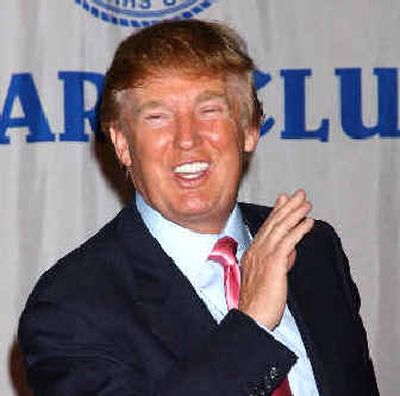Celebrity CEOs are often no bargain

NEW YORK — Superstar chief executives such as Hewlett-Packard Co.’s now ex-CEO Carly Fiorina may earn mega pay, grace business magazine covers and hobnob with world leaders — but they may not be the best leaders for their companies.
Academics who study successful CEOs say companies are better off with a little known CEOs who disdain fame and mind the business.
Consider some superstars for whom ubiquity didn’t equal success: Donald Trump is the master of the universe on his TV show, but that didn’t prevent his casino and hotel business from filing for bankruptcy a second time in November.
L. Dennis Kozlowski of Tyco International graced the cover of “BusinessWeek” as “The Most Aggressive CEO” and was held up as a model — until his company-sponsored lavish living triggered a government investigation. And don’t forget superagent Michael Ovitz, who was supposed to save The Walt Disney Co. from a leaderless future but only lasted 14 months before walking away with a $140 million severance package.
They make Fiorina’s fall look mild. Fiorina was pushed out by the board this week after almost six years of keynote speeches, pep rally-leading and flights on the corporate jet, for both personal and professional trips.
“She was spending more time in front a video camera than she was with her people,” said Warren Bennis, founding chairman of the Leadership Institute at University of Southern California.
The company’s board signaled that it agrees.
Patricia C. Dunn, whom the company appointed as interim non-executive chairman said the job, in the future, would be “very reliant on hands-on execution.” Translation: The next CEO will spend less time in the spotlight and more time visiting customers, talking to workers and crunching numbers.
Fiorina has limited her comments to a statement Wednesday, when she said, “While I regret the board and I have differences about how to execute HP’s strategy, I respect their decision.”
A model for the company’s next CEO may be International Business Machines Inc. CEO Samuel J. Palmisano, who joined the company in 1973. If Fiorina is viewed as flashy, Palmisano is seen as tweedy. While she became the public face of HP, Palmisano rarely gives interviews. When he does, he makes sure to say the company will be delegating more, pushing responsibility away from headquarters.
Some measure of fame may be unavoidable for the CEO of a high-profile company. But other famous CEOs, like Apple Computer Inc.’s Steve Jobs, have tried to create a cult following for their company’s products, not themselves.
Simple living on the job helps, too. Contrast Rich McGinn, who oversaw the construction of a corporate boardroom so posh, it was used as a set for the movie, “The Thomas Crown Affair,” during his time as Lucent Technologies Inc., with the work areas of two other equally famous and handsomely compensated CEOs: eBay Inc.’s Meg Whitman and Cisco Systems Inc.’s John Chambers. They both work in nondescript cubicles.
Could having a famous executive hurt a company? Some research suggests it might.
Ulrike M. Malmendier, an assistant professor of finance at Stanford University’s graduate school of business, studied CEOs who made lists of “best managers” and found that afterward, many of them extracted higher compensation from their companies while spending more time and effort on outside activities, such as writing books.
“The companies of superstar CEOs subsequently underperform,” Malmendier wrote, with both the stock and return on assets lagging peers.
James T. Hamilton at Duke University and Richard Zeckhauser at Harvard University found that 20 percent of chief executives generate 80 percent of media coverage.
They found no statistically significant difference in average shareholder returns between companies with a celebrity CEO and other companies. But they did find that chief executives who generate “soft” news stories, articles that contain words such as “personality,” “married,” “divorced,” “smile,” “style” and “wife,” were more likely to be charged later with evading regulations or misusing company resources than other CEOs.